Helen Kollias, PhD, is PN’s science advisor and coauthor of Precision Nutrition’s Level 1 Certification textbook, The Essentials of Nutrition and Coaching. An exercise physiologist, Dr. Kollias earned her doctorate in Molecular Biology from York University in Toronto, specializing in the area of muscle development and regeneration. She has a master’s degree in Exercise Physiology and Biochemistry from the University of Waterloo, and has taught exercise physiology, molecular biology, and biochemistry at the university and college level.
Before joining Precision Nutrition, Dr. Kollias held research positions at some of the most prestigious institutions in the world, including Johns Hopkins and Toronto’s Hospital for Sick Children. She has been published in 10 scientific journals in exercise physiology and molecular biology.
Facebook: HelenKolliasPhD
Twitter: @hdkollias
Articles by Helen Kollias, PhD

Menopause and sleep: The struggle is real (and, by the way, so are these solutions)
Sleep disruptions are caused by many different factors, not just hormones.

What are BCAAs—and are they worth it?
Here’s the truth, according to science.
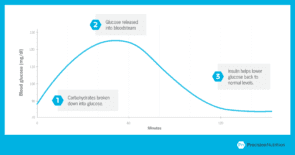
Carbs, insulin, and weight loss: What REALLY matters for getting the results you want
Some experts believe carbs and insulin cause weight gain. But, they say, if you eat a low-carb diet, you’ll keep insulin levels low—and lose weight fast. Learn the truth… and find out what matters most for losing fat.

‘How much protein should I eat?’ Choose the right amount for
fat loss, muscle, and health.
Will too much protein damage my kidneys? Cause cancer? Reduce my lifespan? At Precision Nutrition we're always getting questions (from fitness pros and clients) about the risks of a high-protein diet. In this article we'll set the record straight and share why protein isn’t the villain it’s made out to be.

Case study: The Biggest Loser
"Will decades of dieting mean a broken metabolism?" It's a common anxiety. Case in point: The Biggest Loser, whose contestants are famous for dramatic weight loss — and for the devastating regain that sometimes follows. In this article, we break down a study examining exactly what happened to their metabolisms — and what this means for everyone else who wants to lose weight and keep it off.
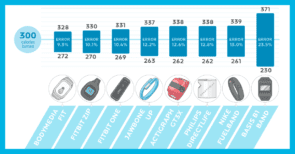
The surprising problem with calorie counting. [Infographic]
Think meticulous calorie counting means knowing exactly how much breakfast you’re burning during exercise? Unfortunately, it’s more complicated than that. Here, 4 reasons why daily activity tracking and exercise counts can be problematic.
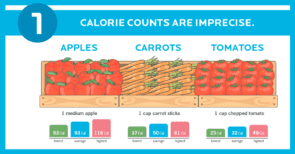
The surprising problem with calorie counting. [Infographic]
Most people who count calories for weight loss or weight management assume it’s an exact science. It’s not. Here we outline 5 reasons calorie counting (i.e. logging your food to calculate intake) is fundamentally flawed.
Are GMOs bad for your health?
GMOs are such a hot topic nowadays. With so many people debating the pros and cons, it’s hard to know what to think. So let’s answer the question: Are GMOs bad for you health? And then let’s look at a few other important questions.
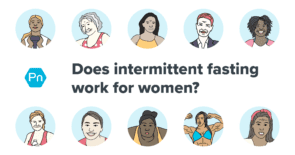
Does intermittent fasting work for women?
Intermittent fasting works for some women, while others have problems. Read the latest research on intermittent fasting for women to see if it's right for you.
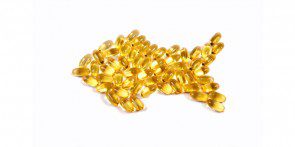
Fish oil and omega-3 fats:
Everyone knows that fish oil is awesome. It’s full of omega-3 fatty acids, which do so many fantastic things in the body. Indeed, for the last few years almost every health expert has recommended a varied intake of omega-3 fats as well as fish oil supplementation. However, lately, fish oil has come under fire. Some claim that fish oil could be hurting instead of helping us. That we’re consuming too much. That we’re in danger. In today’s article, we’ll review the latest research paper that’s confused and bewildered many people. And we’ll help you make sense of the controversy.
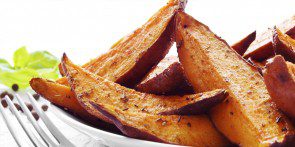
Carbohydrate tolerance:
Ever wonder why some people can eat bushels of bananas without gaining a pound, but you seem to gain weight by just looking at a potato? Maybe it’s your genes. But just because you’re “carb intolerant” doesn’t mean you’re doomed. These simple guidelines can help.
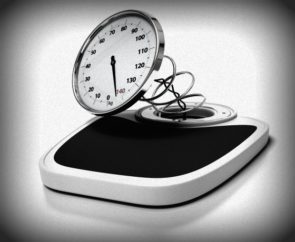
Cardio vs. weights:
Contrary to recent headlines, aerobic exercise alone is not a recipe for faster fat loss. Instead, a combination of resistance training and aerobics will lead to the most impressive, and longest lasting improvements in body composition.
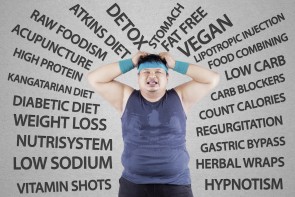


Share